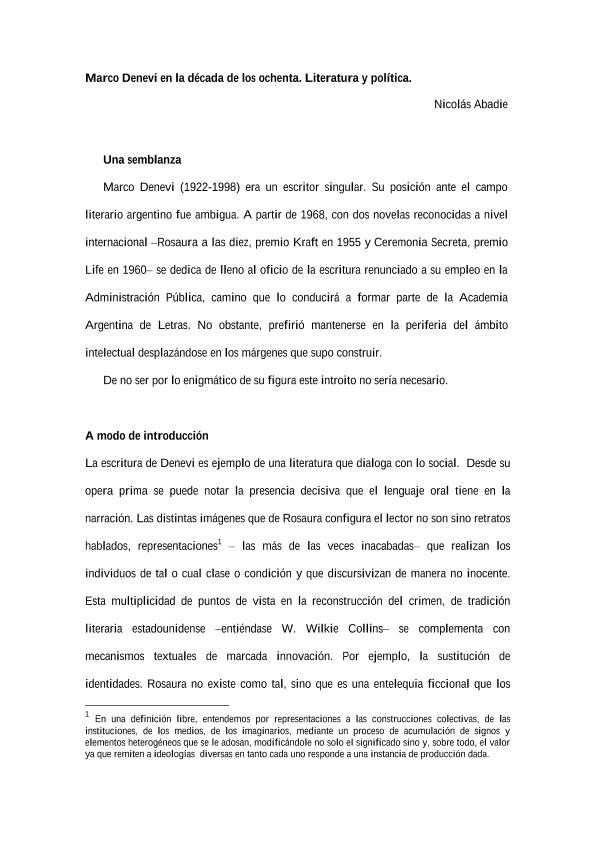Mostrar el registro sencillo del ítem
dc.contributor.author
Abadie, Nicolás Daniel

dc.date.available
2023-06-12T15:03:09Z
dc.date.issued
2012-06
dc.identifier.citation
Abadie, Nicolás Daniel; Marco Denevi en la década de los ochenta. Literatura y política; Instituto Profesional de Estudios Superiores Blas Canas; Literatura y Lingüística; 1; 25; 6-2012; 61-82
dc.identifier.issn
0716-5811
dc.identifier.uri
http://hdl.handle.net/11336/200294
dc.description.abstract
Con la vuelta de la democracia en Argentina en 1983 comienzan a circular discursos de lo más diversos que tenían como objeto de análisis las causas sociales y políticas que motivaron el último golpe de estado. Dentro de esta eclosión de objetos literarios, encontramos ficciones que indagan en el modelo de país que se aspiraría a construir y otras que anticipan el futuro de la nación a través de la lectura de los acontecimientos que sucedían en ese momento. Marco Denevi (1922-1998) en esta década incorpora a su particular modo de entender la literatura el rol determinante de la política. Después de haberse iniciado en el relato policial, creado minificciones, escrito piezas teatrales y novelas de gran mimetismo con la clase media argentina, en las obras publicadas en los 80 buscará encontrar las causas del fracaso de esa ?anomalía histórica? que se dio en llamar Argentina, sobre todo en la predisposición psicológica y el carácter del porteño rioplatense. Manuel de historia (1985), Enciclopedia secreta de una familia argentina (1986) y La República de Trapalanda conforman una especie de trilogía narrativa en la que el personaje principal es la nación en su conjunto.
dc.description.abstract
With the return of the democracy in Argentina in 1983 they begin to circulate several speeches that took as an object of analysis the social and political reasons that motivated the last military dictatorial government. Inside this great manifestation of literary objects, we find fictions that investigate the model of country who would aspire to construct and others that anticipate the future of the nation across the reading of the events that were happening in this moment. Marco Denevi (1922-1998) in this decade incorporates into his individual way of understanding the literature the determinant role of politics. After writing has begun in the police statement, created minifictions, theatrical pieces and novels of great mimetism with the Argentine middle class, in the works published in the 80 it will seek to find the reasons of the failure of this "historical anomaly" that was given in calling Argentina, especially in the psychological predisposition and the character of the argentinean people.
dc.format
application/pdf
dc.language.iso
spa
dc.publisher
Instituto Profesional de Estudios Superiores Blas Canas

dc.rights
info:eu-repo/semantics/openAccess
dc.rights.uri
https://creativecommons.org/licenses/by-nc-sa/2.5/ar/
dc.subject
LITERATURA Y POLÍTICA
dc.subject
MARCO DENEVI
dc.subject
NOVELA DE ANTICIPACIÒN
dc.subject
NOVELA HISTÓRICA
dc.subject.classification
Estudios Generales de Literatura

dc.subject.classification
Lengua y Literatura

dc.subject.classification
HUMANIDADES

dc.title
Marco Denevi en la década de los ochenta. Literatura y política
dc.title
Marco Denevi in the decade of eighties. Literature and politics
dc.type
info:eu-repo/semantics/article
dc.type
info:ar-repo/semantics/artículo
dc.type
info:eu-repo/semantics/publishedVersion
dc.date.updated
2023-05-30T11:49:36Z
dc.journal.volume
1
dc.journal.number
25
dc.journal.pagination
61-82
dc.journal.pais
Chile

dc.journal.ciudad
Santiago de Chile
dc.description.fil
Fil: Abadie, Nicolás Daniel. Universidad Nacional de Córdoba. Facultad de Filosofía y Humanidades. Centro de Investigaciones María Saleme Burnichón; Argentina
dc.journal.title
Literatura y Lingüística

dc.relation.alternativeid
info:eu-repo/semantics/altIdentifier/url/https://www.scielo.cl/scielo.php?script=sci_arttext&pid=S0716-58112012000100004
dc.relation.alternativeid
info:eu-repo/semantics/altIdentifier/doi/http://dx.doi.org/10.4067/S0716-58112012000100004
Archivos asociados
